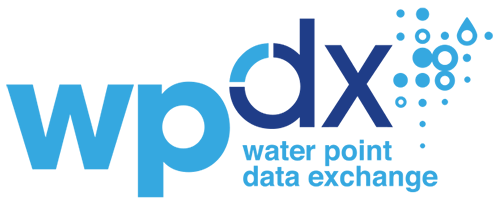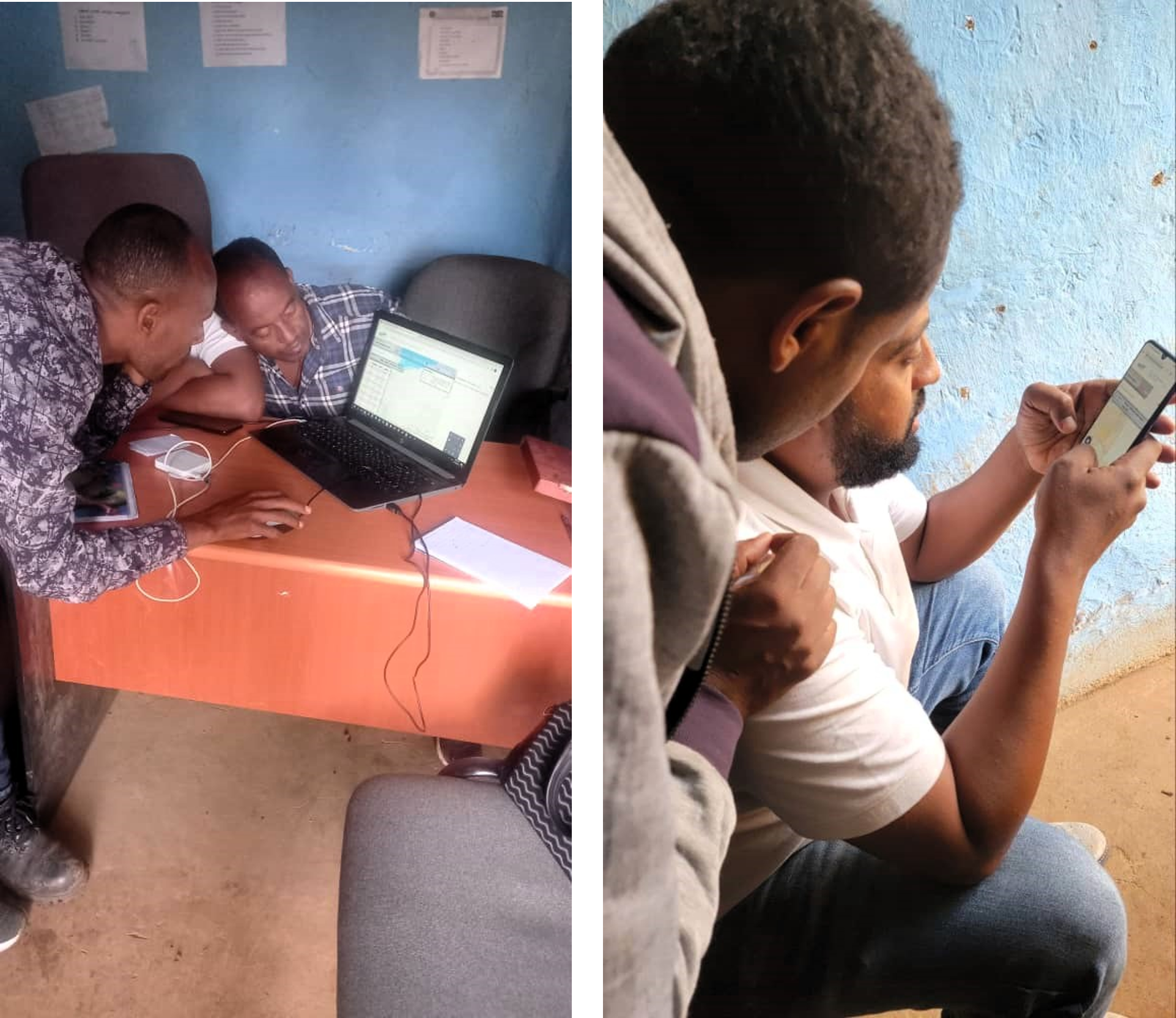
Figure 1. Dera Woreda Validation Team using WPdx Rural Decision Support tools to identify the top three priority areas for new water point construction work
Guest blog by: Selamawit Tiruneh and Mussie Tezazu with the Millennium Water Alliance
This blog is cross-posted on the Millennium Water Alliance website at this link.
The water management landscape in Ethiopia has faced numerous challenges, particularly in terms of collecting, organizing, and efficiently utilizing water point data. The Water Point Data Exchange (WPdx) is an open-source platform designed to address these challenges by unlocking the potential of water point data. It provides invaluable insights into water point sustainability, thereby supporting evidence-based decision-making to improve water services.
Despite efforts to systemize water point data in Ethiopia, including the National WASH Inventory II conducted in 2018, stakeholders have struggled with fragmented data collated via differing approaches, tools, and methods. The consequence? Valuable data are often used solely for reporting purposes rather than informing stakeholders and driving decision-making processes for prioritizing investments in new water points and rehabilitations.
The Millennium Water Alliance (MWA), through over fifteen years of work on water supply in Ethiopia, recognizes these challenges. Knowing the urgent need to strengthen the Ethiopian government’s capacity in water supply data management, analysis, and evidence-based decision-making, MWA partnered with Global Water Challenge’s Water Point Data Exchange (WPdx) to incorporate these factors into the development of the Sustainable WASH Program (SWP) with the support of the Conrad N. Hilton Fund. This program, aimed at systems strengthening, runs from 2019 to 2024.
Features and Functionalities of the WPdx Decision Support Tools
The Water Point Data Exchange (WPdx) Rural Decision Support Tools are robust suite of cutting edge analytics, offering unique capabilities that help decision-makers make use of data uploaded onto the WPdx platform. These tools, which integrate additional information from external population, demographic and environmental data sources, provide comprehensive insights for water point management.
MWA utilized the WPdx Rural Decision Support Tools web application to conduct a Service Gap (New Construction) Identification Analysis. This analysis aims to determine where new water points would provide the most access to people. MWA also completed a Rehabilitation Priority Analysis and a Status Prediction Analysis for the three targeted Woredas (Dera, Farta, and N. Mecha) of the Amhara region.
Selected Locations for Validation and Rationale
For validation purposes, the Service Gap Identification Analysis for one Woreda, Dera, was chosen as it had the most recent and comprehensive data available (verified by Woreda Water Office). According to the Woreda Water Office, Dera has a total of 1,457 water points with a non-functional rate of 12.9%. Three locations within Dera were selected for validation, which were highlighted by the analysis as the top three high-priority areas for new water point construction.
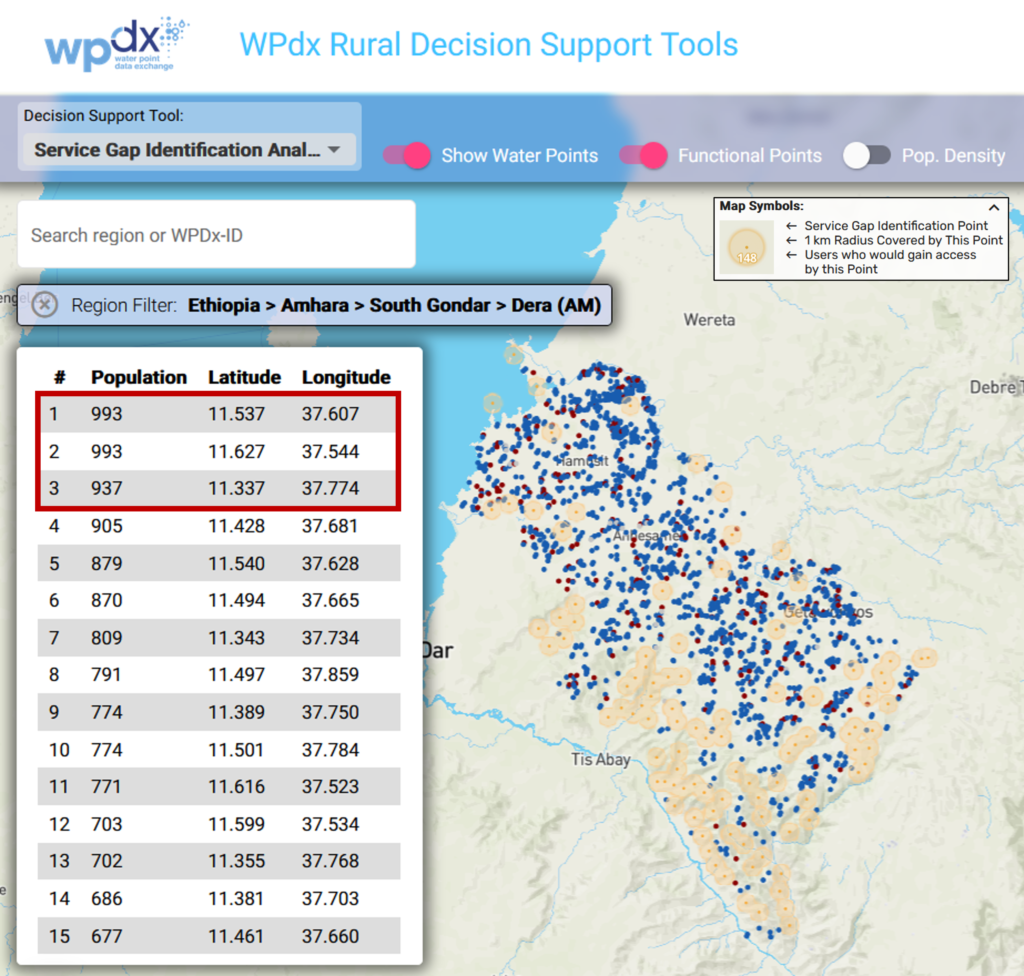
Figure 2: Output of WPdx Rural Decision Support Service Gap Identification Analysis tool for Dera Woreda. The team selected the top 3 sites from the list for validation.
Validation Process
The validation process was conducted by a multidisciplinary Woreda technical team. Members of this team included professionals from the fields of Water, Health Education, Finance, Management, Planning, and WASH Engineers from World Vision Ethiopia. The validation team compared the outputs from WPdx with the existing Woreda priorities. The process consisted of the following steps:
1. Identifying priority locations for new Water point construction in WPdx:
In collaboration with the Woreda Water Office experts, the location of the three top priority areas were identified using the WPdx Service Gap Identification Analysis tool. These points are ranked by the size of the population that lives within 1km of each proposed site. These populations are evaluated by WPdx as not having access to any existing functional or non-functional point based on available data. The villages of Kolacherkos, Abunehara Dingile, and Zemade were given the highest priority for new water point construction.
Kolacherkos village in Dewol kebele has a water service coverage of 36%.
Abunehara Dingile village in Kibebalata Kebele with water service coverage of 39.5%.
Zemade village in Mecho Kebele, has the lowest water service coverage of the three, at 18%.
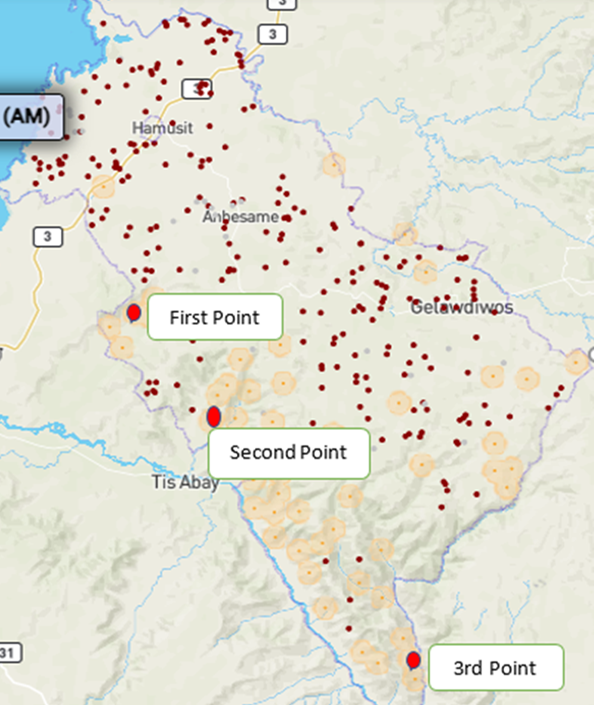
Figure 3: Top 3 priority locations for new water point construction in Dera Woreda based on WPdx Rural Decision Support Tool
2. Water Coverage Evaluation: The team then reviewed the results of the Service Gap Identification Analysis. This analysis helped the team understand the extent of water access challenges in these communities and the potential population that could be served by placing new water points at the identified locations.
3. Water Point Data Verification: Upon zooming into the specific locations, the team asked the Woreda Water Office if there were any water points within a 1km radius that the community could access that were not captured in WPdx such as a private institution providing water. This was important in understanding the existing water sources and their sufficiency in meeting the community’s needs.
The verification also showed that these locations were located far from the woreda capital and inaccessible by vehicle and the team was therefore unable to visit the sites in person at the time.
4. Review of existing Woreda New Construction Priorities: The team also asked the Woreda WASH technical team to identify their top three priority areas for new construction at that time to compare with the results from the WPdx analysis.
5. Consultation with the Woreda WASH Technical Committee: The team then organized a roundtable discussion event with the Woreda WASH Technical Committee. This committee is responsible for identifying priority areas for new water point construction each year, so their insights are crucial in understanding the status of water access in the identified locations.
During this discussion, the committee confirmed that the villages identified in the WPdx analysis are indeed priority areas for the construction of new water points. They also discussed the parameters they consider when prioritizing the construction of new water points, giving the validation team further insights into how decisions are made at the local level:
- Current Kebele water access levels
- Road access for mobilizing drilling rigs and other machinery
- Presence of existing institutions, such as healthcare facilities and schools, that can share water access with communities
- Comparison of budget available to the technology required at that location
Validation Results
The validation process affirmed the effectiveness of the WPdx tool in identifying priority areas for new water point construction. The identified villages – Kolacherkos, Abunehara Dingile, and Zemade – were among the Woreda’s priority areas. These findings corroborate the accuracy of the WPdx tool’s analyses and demonstrate its potential utility in informing and guiding water point construction decisions.
In summary, the validation process was comprehensive, incorporating both data analysis and consultation with local experts. The results have reinforced the value and applicability of the WPdx tools in supporting evidence-based decision-making to improve water services.
Stakeholder Discussions
Following the field visit, in-depth discussions were conducted with key stakeholders to further validate the findings and ensure a comprehensive understanding of the local context. These discussions provided valuable insights into the water supply challenges in the target areas and the potential benefits of the WPdx platform in addressing these issues.
Woreda WASH Technical Committee’s Insights: During the roundtable discussion, the Woreda WASH Technical Committee concurred with the identified priority areas and confirmed the need for improved water access in these villages. The committee members highlighted the fact that these villages are in remote areas far from the Woreda capital and with poor road access, making water supply efforts difficult. Despite the challenging topographical conditions and need for more advanced techniques like deep well drilling, the committee reaffirmed the importance of these areas for new water point construction.
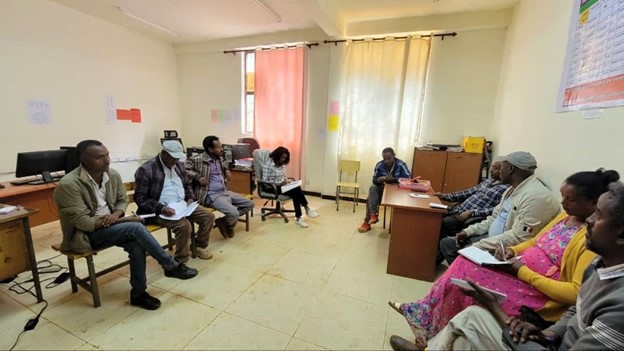
Figure 4: Table level discussion with Dera Woreda WASH technical committee members
World Vision Ethiopia’s (WVE) Experience: Ato Mesfin Geremew, a WASH Engineer with World Vision Ethiopia, shared a previous experience where they attempted to establish a water point in Mecho Kebele (point 3). Due to the challenging nature of the terrain resulting in deep groundwater, traditional hand-dug wells were not a feasible solution. They resorted to roof rainwater harvesting to provide water access to the local health center, highlighting the complexity of water sourcing in these areas.
Woreda Water Office Priorities: The Woreda Water Office officials and experts outlined their current priority areas for new water point construction. Notably, they mentioned that points being constructed this year are in Kolacherkos village, identified by the WPdx tool as a high priority. This is a testament to the accuracy of the WPdx platform and its potential to assist in strategic planning.
Parameters for Prioritizing Construction Locations: The committee members also shared the key parameters they consider while identifying priority areas for new water points. These include existing Kebele level water access, road access, presence of community institutions such as healthcare facilities and schools which would be prioritized for access that would serve the community as well, and budget constraints relative to the required technology (deep wells vs. shallow wells). This discussion provided crucial insights into local decision-making processes, identifying an opportunity for tools like WPdx to be customized to consider a range of factors beyond simple water coverage. For example, although WPdx may identify a priority location, the water committees also consider technology requirements and their existing budgets. Furthermore, the committee may prioritize providing institutional access, over a location that maximizes access to the most individuals, as identified by the WPdx tools.
Acceptance of the WPdx Platform: Overall, stakeholders commended the WPdx platform’s potential to support decision-making processes in prioritizing new water point construction locations. The ability of the tool to analyze a range of factors, such as population and location, and to prioritize based on these factors was acknowledged as a significant step towards more data-driven and evidence-based planning.
Recommendations and Next Steps
The validation field visit to the three prioritized villages offered a practical understanding of the accuracy and potential of the WPdx Rural Decision Support Tools in the context of rural water service planning. The findings were both encouraging and informative, underscoring the tool’s relevance and identifying possible areas for future customization and refinement.
Recommendations
Incorporation of Local Parameters: The effectiveness of the WPdx decision support tools was confirmed. However, to improve its precision further, MWA and the Woreda technical team recommend integrating local parameters into the tool. For instance, parameters such as road access, presence of local community institutions, and topographical (well depth and terrain) considerations should be considered.
Include Technology Recommendations: To enhance the Service Gap Identification Tool’s applicability, it should ideally also recommend the most suitable water supply technology for each priority area. The tool should consider data such as depth of existing wells in the vicinity, geology, and anticipated water demand when making this recommendation.
Stakeholder Engagement: Continual engagement with local stakeholders like the Woreda WASH Technical Committee and Water Office is necessary to understand their needs, improve the tool’s usability, and ensure its recommendations align with local conditions and priorities.
Next Steps
Regular Data Updates: To ensure the tool’s accuracy remains high and its recommendations are up-to-date, local government would need to establish a regular data update mechanism at the Woreda level. This will involve collaborating closely with local officials and stakeholders to ensure data is updated regularly and accurately.
Dissemination and Training: To increase the tool’s adoption and impact, MWA will further disseminate tools and conduct trainings with Woreda staff. This will involve explaining the tool’s functions, its benefits, and how to use it effectively.
Budget Mobilization: MWA will use the evidence gathered from this validation activity to continue to mobilize resources and encourage investment in infrastructure, such as road access, which is crucial for successful water point implementation.
In conclusion, while the WPdx Rural Decision Support Tools have demonstrated significant potential in guiding water service interventions, ongoing refinement and close cooperation with local stakeholders are critical to their continued success.
Funding for the work discussed in the post was generously provided by the Conrad N. Hilton Foundation.
Photo credits: Selamawit Tiruneh and Mussie Tezazu (Millennium Water Alliance)
Authors: Selamawit Tiruneh and Mussie Tezazu (Millennium Water Alliance)
Reviewers: Katy Sill (Global Water Challenge), Tamene Chaka, and Jason Lopez (Millennium Water Alliance)
The Millennium Water Alliance is a permanent global alliance of leading humanitarian and private organizations that convenes opportunities and partnerships, accelerates learning and effective models, and influences the WASH space by leveraging the expertise and reach of its members and partners to scale quality, sustained WASH services. MWA’s 20 members work in more than 100 countries around the world. MWA serves as a hub for major programs in Kenya and Ethiopia.
The Water Point Data Exchange is an initiative of the Global Water Challenge (GWC). GWC is a coalition of leading organizations committed to achieving universal access to safe water, sanitation, and hygiene (WASH) and women’s empowerment. With companies, civil society partners, and governments, GWC accelerates the delivery of safe water and sanitation and supports gender equality through partnerships that catalyze financial support and drive innovation for sustainable solutions.
